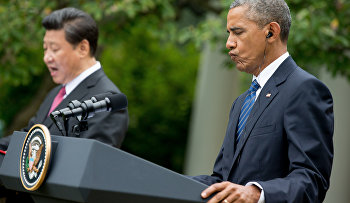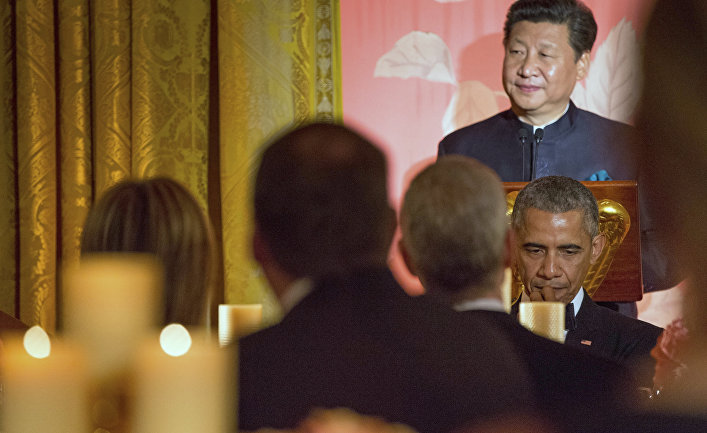During his first state visit to the United States Chinese President Xi Jinping met with President Barack Obama. Despite the warm atmosphere of the visit, there were no obvious breakthroughs on top issues. Amid unresolved topics of cyber security, ongoing disagreement over the ownership of the South China Sea territories, as well as human rights problems, the main achievement of the US-China summit proved to be an agreement on combating climate change.
Visiting the US since Tuesday, Chinese President arrived in Washington for a meeting with the President Barack Obama only the following Monday. The first stop in Xi Jinping’s itinerary was Seattle, where the leader and business representatives met with American business executives. As the leaders of the two countries pledged after the talks in Washington, the trade relations between the two major world economies would continue its further development. United States is the main trading partner of China; and China is the third in the American trade list after the EU and Canada. Trade turnover between the two countries reached $590 billion in 2014. However, previously announced "Treaty on protection and promotion of investments" has not been signed. The parties confined themselves to a declaration of intention to sign it in the nearest future.
Yet the meeting of the Chinese President and the head of the White House took place in a friendly relaxed atmosphere. The official part of the ceremony included fireworks and assurance of the growing Sino-American friendship. The Chinese leader confirmed the turning of a "new page" in relations between Beijing and Washington.
However, the old controversies between Washington and Beijing still remain unresolved. Hacker attacks from China territory to US companies and agencies remain a major irritant. Last August The Washington Post reported, that the White House was preparing to impose sanctions on individuals and legal entities in China, involved in cyber attacks against the US. Yesterday Xi Jinping denied the accusations that these diversions had been induced by the Chinese authorities. During the final press conference, US President said that he pointed his Chinese counterpart at the fact of a growing threat of cyber security and necessity to stop it. Therein, Barack Obama highlighted that "he found understanding from the Chinese side." In the outcome, mutual understanding was limited only by an oral agreement not to allow industrial cyber espionage. Clearly, not all the problems in the area of cyber security were expected to be resolved at once. At least, a "Cyber non-hack pact on key infrastructure" was expected to be signed. The negotiations on fighting cyber crimes turned out to be very modest though.

Both parties only managed to fix previous discrepancies and difficulties in the following areas — human rights issues, for which China is being often criticized by the United States, the problem of Tibet and Taiwan as well as China's territorial disputes in the South China Sea. Xi Jinping, to the displeasure of his American counterpart, made some statements about "sovereignty" of those areas. According to the experts interviewed by “Kommersant”, Beijing expects that Barack Obama would not respond tough to the creation of artificial islands for fear of causing local conflict before the very end of his presidential term. China considers the current situation as an opportunity to create new islands and develop its military infrastructure there. However, this calculation cannot not be justified, which makes it the hair-trigger situation.
"The results of the talks in Washington confirmed our negative expectations “, said Head of the Program "Russia in the Asia-Pacific region” of the Moscow Carnegie Center, Alexander Gabuev. There are no issues in the area of business between China and the US; both economies will serve long as a basis for major transactions while keeping high trade turnover. But escalation of political differences and lack of fixed written mechanisms, restraining confrontation within certain limits, can lead the countries into conflict. According to "Kommersant" expert, the failure to sign the earlier announced "Cyber non-hack pact on key infrastructure" and lack of specific measures aimed at preventing industrial cyber-espionage (oral agreements cannot be considered actual) is an obvious troubling sign. "Without contractual basis and under condition of growing distrust, theft of trade secrets can lead into US sanctions (Barack Obama confirmed yesterday this possibility), inducing a wave of escalation and counter-escalation in cyberspace", — warns the expert.
Against this background, perhaps the main achievement of the talks would be a declaration on cooperation in the fight against climate change caused by greenhouse gas emissions. The Chinese leader reiterated that China, which produces most of the world's emissions harmful for the atmosphere, is ready to launch a program aiming at the reduction of emissions in 2017. By 2030 Beijing intends to achieve the reduction by a quarter, while US plans to achieve the same result in 2025. China's status as a developing country allowed it before not to join the other major states in their program of reducing greenhouse gas emissions. The experts believe that this gesture of goodwill, confirmed by the Chinese leader yesterday in Washington, can be numbered among the achievements of the President of the United States.






